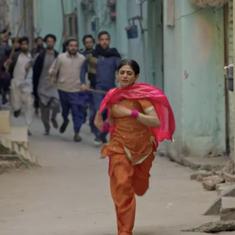The victim’s family say the administration has offered no help to the woman in accessing medical facilities even after the court's order.
Gang-raped in captivity
The 23-year-old woman, whose husband sells clothes off a push-cart, stated that she was abducted from her mother's home in Botad district of Gujarat last July. Over the next nine months, seven men kept her captive in various places and raped her. She managed to flee in March and contacted the police with her family's help. She has two children.
The police initially refused to register a First Information Report, asking the woman to reach a settlement with the perpetrators instead, said the woman's father.
On March 16, two days later, the police registered an FIR. During a medical examination, she was recorded to be 23 weeks pregnant. On March 23, the staff at a public hospital in Ahmedabad refused to terminate her pregnancy without the court's permission as the pregnancy had crossed 20 weeks, the limit for abortions under the Medical Termination of Pregnancy Act 1971. The lower court at Dhanduka on March 23 declined permission citing Act, and three weeks later, on April 16, the High Court upheld the lower court order and declined her permission to undergo an abortion.
What the law says
The Medical Termination of Pregnancy Act 1971 regulates the conditions in which doctors may terminate a pregnancy. It specifically allows a registered medical practitioner to terminate a pregnancy of 12 to 20 weeks in the case of an unwanted pregnancy caused by rape or by the failure of a birth control device. “Where any pregnancy is alleged by the pregnant woman to have been caused by rape, the anguish caused by such pregnancy shall be presumed to constitute a grave injury to the mental health of the pregnant woman,” it says.
In cases where the pregnancy has exceeded 20 weeks, however, as in the case of the Gujarat-based complainant, the law allows the termination of the pregnancy based on a doctor's opinion if it is found to be necessary to save the life of the woman. A draft MTP (Amendment) Bill by the Ministry of Health and Family Welfare last October extends this limit to 24 weeks in cases where there is risk of grave injury to a woman's mental and physical health, including in a pregnancy resulting from rape.
In this case, the woman was held captive and had no means of accessing medical services till she managed to flee, while she was 22 weeks pregnant. The lower court gave no thought or concession either to the woman's peculiar circumstances, or the effect of the unwanted pregnancy on her mental health. By the time the petition came up in the High Court, another three weeks had lapsed.
“Personhood for foetus”
Justice JB Pardiwala of Gujarat High Court's begins his 38 page-order dismissing the woman's petition by stating that he is considering “two questions of considerable importance – i.e., One, is the foetus a human being with a fundamental right to life? And two, does a woman have the right to choose whether or not to have an abortion?”
At several places in the judgement, Justice Pardiwala speaks of the foetus and its rights. He quotes a 1920 textbook Modi on Medical Jurisprudence and Toxicology to state that some point of time between 18-20 weeks, a woman is said to be “quick with the child” denoting the first perception of “quickening or the foetal movement”. “This term arises from the old notion that a foetus becomes endowed with life and secures an identity apart from the mother, when the movements are felt by the mother,” he adds.
“As I am considering the issue of the right to life of foetus, I deem it appropriate to quote a West German Constitutional Court decision in the abortion reform law case,” Justice Pardiwala states before citing the decision of a German court in 1975 which among other features proposed that “human life exists in embryo from the fourteenth day of the conception,” and that “it is the duty of the State to protect and promote the life of the foetus and defend it from unlawful interference by other person”.
He concludes that given the pendency of the investigation, he cannot directly come to the conclusion that it had been a matter of rape. He adds that though the woman was in unlawful confinement, the law does not permit termination of pregnancies beyond 20 weeks except in cases where the life of the mother is in danger.
Mumbai-based lawyer Manisha Tulpule said that the order is in language that grants personhood to the foetus. "Even if the order is as per the MTP Act, the language is insensitive as it does not take into consideration how the woman or her family may view the pregnancy," she said.
Added Dr Sabu M George, a researcher and social activist against sex-selective abortion, "When life begins is a philosophical question, not a biological one and the law does not speak of it. In India and UK, in practice, doctors have the right to terminate pregnancy more than women do, unlike in Sweden where it is clearly a woman's decision.”
What about the victim's protection?
The woman who is back in her home is in poor health. “She is weak and stressed,” her father said on the phone from Botad district. "She has to lie in bed all day."
The High Court ordered the District Collector to ensure the woman had a safe delivery and to help access to medical services. It has been a week but the family members said they had received no help so far and the District Collector had neither visited nor inquired after the woman’s health.
The Juvenile Justice (Care and Protection) Act 2000 has provisions where a child in need of care and protection may be given up for adoption by a parent before the concerned Child Welfare Committee. In the order, instead of pointing out these helpful provisions of the Act and ensuring counselling for the woman, the High Court asked the Collector to “keep a close watch on the applicant and her family members” so that the child to be born is not abandoned.
In a 2010 order, the Supreme Court, in the Suchita Srivastava vs. Chandigarh Administration case, held the woman's consent crucial in the decision to undergo an abortion. “There is no doubt that a woman's right to make reproductive choices is also a dimension of 'personal liberty' as understood under Article 21 of the Constitution of India," it stated. "It is important to recognise that reproductive choices can be exercised to procreate as well as to abstain from procreating.”
It added, “The crucial consideration is that a woman's right to privacy, dignity and bodily integrity should be respected.”
It is this principle outlined by the Supreme Court that the Gujarat High Court and the administration have failed to uphold and implement as a priority.










